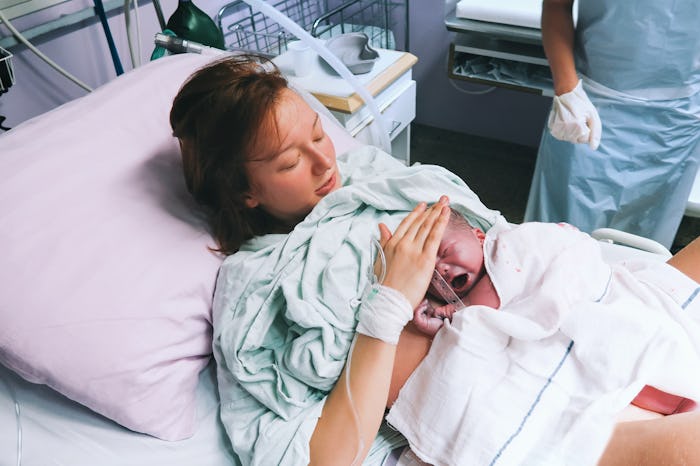Life

If You're Hoping To Take Your Placenta Home After Birth, Here's What You Need To Know
If the uterus is the strongest human muscle, the placenta is the coolest human organ. It grows from scratch when you become pregnant and supports the fetus with oxygen, nutrients, and waste disposal. The placenta even has its own stage of labor — it's the third — and gets delivered vaginally (or removed during a cesarean section) after your baby. With all the wonders this organ performs in just nine months, it's no wonder that women in many cultures keep their placenta after birth. In the United States, will the hospital give you your placenta? The answer may depend on the hospital's particular approach or policy, as well as the condition of your placenta, reported Parents. If the placenta was damaged during pregnancy, it may need to be tested to determine any risks to the baby.
"Every hospital has their own policy regarding placenta release, but almost always the placenta can be released immediately," says Heather Meyer, a Certified Placenta Alchemist who has encapsulated more than 700 placentas since 2012. Whether you plan to encapsulate or have a different reason for bringing your placenta home, Meyer tells Romper she recommends contacting the hospital in advance so you can make plans around their policy. In her experience working with clients, "some hospitals want to hold the placenta anywhere from 24 to 72 hours, and some want the placenta out of the hospital within a couple of hours." If you deliver at a freestanding birth center you may find not just cooperation with your wish, but enthusiastic support for placenta encapsulation.
Knowing how the hospital will handle your placenta release request helps you coordinate with any third parties involved in your plans. If you simply wish to take your placenta home and bury it, or otherwise plan to handle it yourself, you'll need to know what type of materials, if any, the hospital wants you to transport your placenta in. Or they may give it back to you already packaged. Your OB may be able to answer some of your questions, too, if they've had previous patients who kept their placentas. As for encapsulators, Meyer says they all have their own methods. "I provide my clients with everything they need in one kit. They take that kit to the hospital, the nurse packs up the placenta, puts it in the cooler, then someone puts ice on it and calls me to arrange pick up."
If you're skeptical about the hassle or expense of keeping your placenta (encapsulation, for example, can cost between $100 to $300 depending on your area), you may be wondering why it's worth it. For some women and families, it's symbolic. They want to bury the placenta next to a newly planted tree to symbolize humans' connection with the earth and have another reminder of their baby's growth. Others like the idea of turning the placenta and/or umbilical cord into a keepsake item like a picture frame, piece of jewelry, or ornament.
Consuming a placenta (the official term is placentophagy) may seem like the strangest option of all, but it's actually common among other land mammals, reported The Las Vegas Sun in its article "10 Interesting Facts About Eating Placenta." Asked to name the top three benefits of placentophagy, Meyer says that the main reasons her clients choose encapsulation are "the potential benefits of a faster recovery, stable moods, and general postpartum well being."
On the other hand, some doctors like Jennifer Gunter have called for more scientific research on the health benefits of consuming your placenta before we reach a consensus. A 2017 article in Science reports on two recent studies that conclude "new moms who consume their placentas experience no significant changes in their moods, energy levels, hormone levels, or in bonding with their new infant, when compared with moms ingesting a placebo." However, the same article quoted Melissa Cheyney, a midwife and medical anthropologist, as saying there is no harm in eating your placenta if you think it will help, as long as you acquire it safely. So do your research with the hospital and your doctor, talk to professional placenta encapsulators like Meyer if you wish to go that route, and make the choice that feels right to you.
Check out Romper's new video series, Bearing The Motherload, where disagreeing parents from different sides of an issue sit down with a mediator and talk about how to support (and not judge) each other’s parenting perspectives. New episodes air Mondays on Facebook.